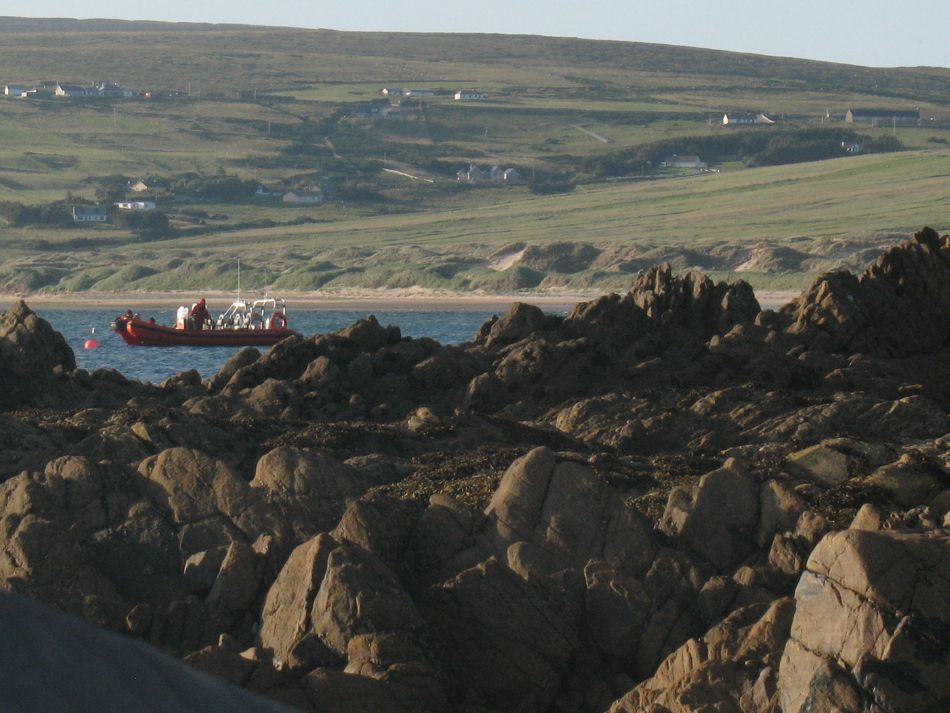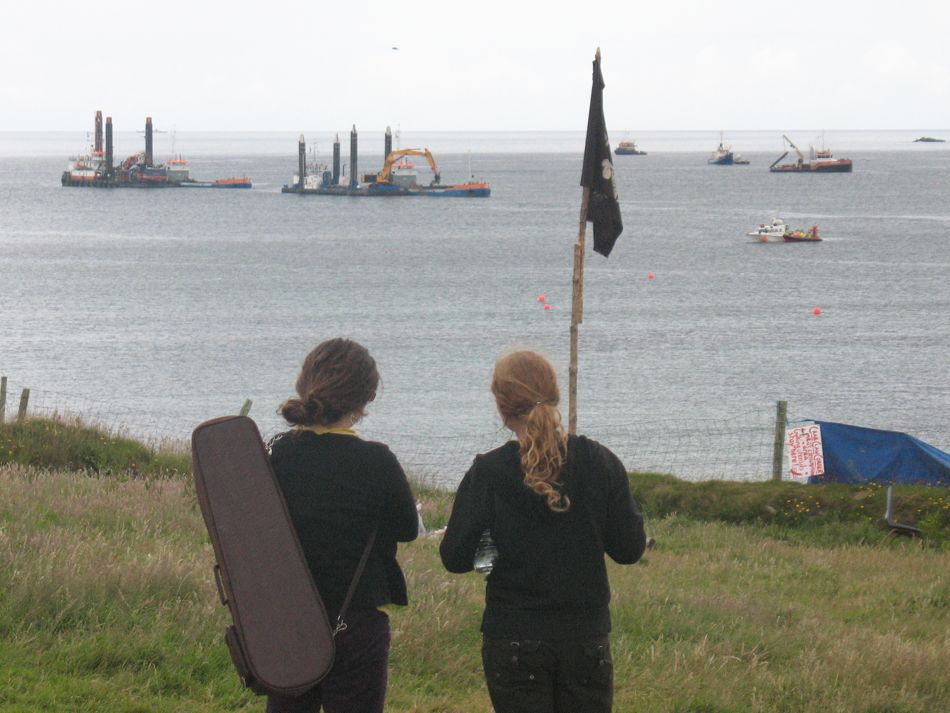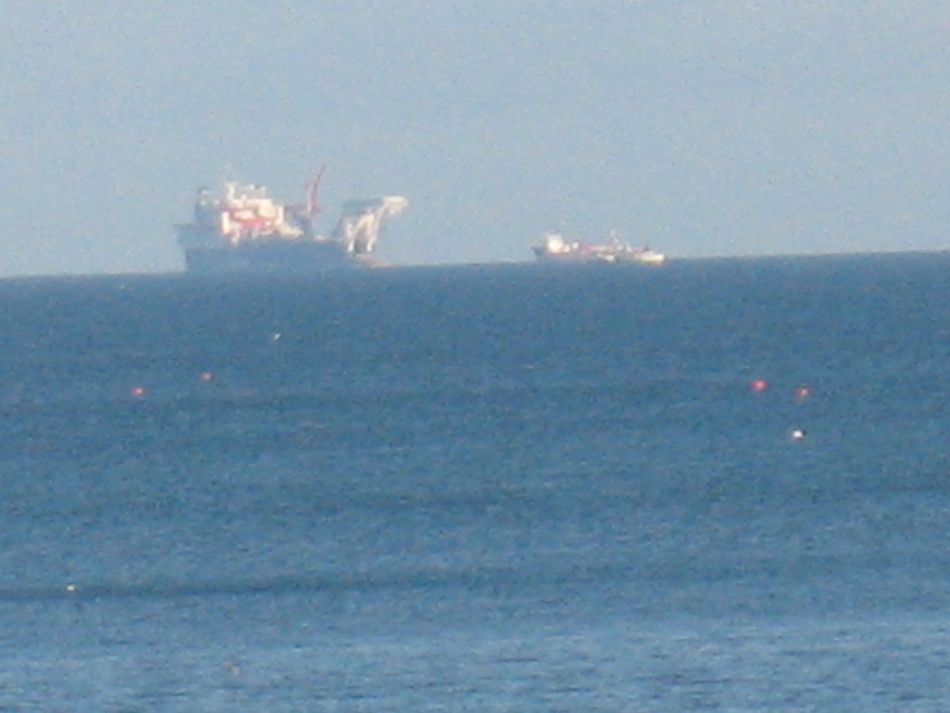Over 30 years of anarchist writing from Ireland listed under hundreds of topics
A weekend in Erris at the national Shell to Sea meeting
I arrived in occupied Erris on Friday evening having travelled down to take part in a national meeting of Shell to Sea groups. It had been a busy week for the campaign as the state had reacted to the ongoing resistance to Shell in Erris by seizing fishing boats, sending 7 people to jail without trial and banning two more from Co. Mayo. Not only had hundreds of state forces including the police, navy, air force and possibly the army been deployed to suppress protest in Erris but those of us doing solidarity work elsewhere had found from time to time that we were being followed by the secret police.
I'd spent the previous night talking to 3 of the 4 women who had been sent to Mountjoy prison until the successful High Court appeal of their bail conditions had forced their release. As they had been banned from Mayo and only had the clothes they were wearing when arrested, on release they were stuck in a strange city without even their wallets, which were back at the Rossport Solidarity Camp where they had been living. We'd put three of them up in my house while accommodation could be sorted out, which had given me a good chance to talk with them about their experiences in Mountjoy prison.
All this provides some context for what my thoughts were as we drew close to Erris. Some more of that context is the very disturbing material I had uncovered on Shell's security company I-RMS and the attempt to start a civil war in Bolivia. I'd published a detailed account of this on Indymedia.ie as 'The Shadow over Erris' and a couple of my comrades clearly felt going down to the belly of the beast might not be a smart move. While somewhat inclined to looking over my shoulder more often than usual, I was of the opinion that very much greater risks were being taken on a day-to-day basis by those in struggle down there and I wanted to continue to play my part in supporting that struggle. Fear is one of the main weapons Shell & the State deploy against all those involved in the struggle, and not without success. But fear can only win out if we allow it to.
State forces at Rossport
By the time we got to the Kilcommon area on Friday, it turned out there had been a massive step down of the state forces on land. Earlier in the weeks the roads for miles around had been swarming with Gardaí, every road leading to the coast had been guarded and around 50 cops constantly manned the beach below the camp, arresting anyone who even went down for a swim. But by Friday evening almost all this had gone.
This confirms the extent to which this massive deployment of force was more a question of psychological warfare than any real security need. The secret police had been spying on the camp for weeks; as far back as the start of June, there was, more often then not, a carload of them with long lenses parked on the road above the camp. So both the state and Shell knew that there would only be 30 or so people at the camp to aid the local resistance. And they also knew that while some of those at the camp had water skills and equipment most of the local people with the exception of the fishermen did not. They clearly had a plan for how to deal with the fishermen, one boat was sunk by armed and masked men in the dead of night just before the Solitaire arrived, two others were seized by the Gardaí, their crew jailed or hospitalised and the boats impounded while the Solitaire was in the bay. The illegal and 'legal' could be said to have worked hand in hand, both reaching the same objective of clearing the waters of Broadhaven bay for Shell.
The purpose of the hundreds of Gardaí on land, the helicopter and the air force plane was not to control resistance but to strike fear and a sense of powerlessness into the hearts of the people of the area. To create the impression that any act of resistance would be futile in the face of such overwhelming force. And just in case, the courts were lined up to ignore all usual procedure and throw any who showed even the most minor resistance directly into jail, taking them, like the fishing boats, 'out of the equation' while the Solitaire was in the bay.

The security boats on the water were the ones that would be used to spy on the camp and to prevent any effective action from the handful of people there with water skills. When the Solitaire was in the bay this force peaked at around 18 RIBs (Rigid Inflatable Boats - rubber boats with fast engines) and motorboats as well as two of the six gunboats of the Irish navy. A rather overwhelming force to deal with little more than half a dozen people in kayaks!
Resistance remains fertile
What had been truly remarkable was that despite the huge forces arrayed against them, a number of successful direct actions had taken place both on water and land which had evaded the huge security presence and brought work to a halt for hours at a time. I intend to detail this and the events that took place in the run up to the arrival of the Solitaire in a later article. But for now there are preliminary reports of these on indymedia.ie, the thing to take from these is that even in what looked like pretty hopeless circumstances some resistance proved to be possible even though those involved were frequently jailed if they were caught.
Driving along the estuary to Glengad I had expected us to run into Garda checkpoints with branch men and had my camera ready to record any stops. But there wasn't a guard in sight until we got to the gates of the Shell compound where there was a van and a couple of cops outside the gates. The next car to arrive at the camp reported that they were no longer there. Even stranger, although I'm sure the branch were around, they were not making themselves visible in the intimidatory manner they normally like to.
Coming over the crest of the hill gave a panorama which was maybe more like what I expected. Looking down at the camp to the bay beyond I could see well over a dozen boats guarding the two dredgers in the bay. Further out, just under a kilometre off, was an Irish Navy gunboat and a good bit further out again the vast bulk of the Solitaire, fading into the evening haze. Apart from during the heavy rain showers the Solitaire would remain in sight all weekend, sometimes being very visible when the haze or mist lifted but more often as a lurking shadow on the horizon. By the time I left on Sunday it was almost out of sight.
The people remaining in the solidarity camp were pleased to see us as we provided the first direct news from their friends whom they had last seen been hauled off to Mountjoy and whose clothes, wallets and tents they had collected and packed for us to bring back to Dublin on our return. Despite the huge pressures they had been under the past few days and the constant surveillance from the multiple boats just off shore the spirits of those at the camp remained strong.
The view from the camp
The camp is located at the edge of a low cliff above the rocky shoreline. A couple of hundred meters to the right as you look towards the sea is the Shell fortification where they brought the pipe ashore on the last Sunday in June. It's now buried three-meters deep beneath the beach.

The tidal zone below the camp is full of jagged rocks but once you get past these there was a ring of fast inflatable boats on station with either Gardaí or private security in them, watching us, day and night. Further out are large motor launches with the two dredgers and further out again the gunships of the Irish Navy. The field the camp is in slopes down to the cliff which means almost every inch of it is visible to the crews of the watching boats. It is initially a strange feeling to be sitting around eating dinner with old friends while constantly being watched by these hostile forces. As the sun sets they turn on lights and the whole night long the view to sea is one of bobbing lights on the smaller boats and brilliant arrays of light from the dredgers and way out to sea the Solitaire. A strange backdrop as we share a few cans and a bottle of wine around the campfire or as others played games of hurley or baseball.
Apart from picking up the gear of the women who had been jailed our main 'mission' was to take part in a National meeting of the Shell to Sea campaign that had been called for that weekend some time before. The timing proved to be excellent, it was precisely the moment after being swamped in the huge security operation of the previous week that both campers and locals needed to be reminded that they were not alone, that solidarity groups existed all over the island.
Just over 50 delegates from the locality and the solidarity groups elsewhere met in the Inver Community Centre just down the coast. Here back at the end of April 300 angry members of the local community had packed in to confront Ministers Eamonn Ryan and O'Cuiv about what Shell had already done to them. I was given a local newsletter in the pub later that night that detailed what had been said to the two ministers, one aspect of the local organising that continues
This Saturday we were gathered to discuss the events of the last days and to plan where the campaign would go to next. I won't report on the specific details of this four-hour long private meeting but the discussion was both frank and constructive. A number of plans for future activity both locally and across the island were sketched out and groups formed to take these ideas and expand on them. A particular focus was the way in which the recession and the government cuts have made the whole issue of 'The Great Gas and Oil Giveaway' of much, much greater significance to almost everyone on the island. The cuts being imposed could be reversed if the Irish government insisted on a new deal with Shell and ditched the giveaway deal given to Shell by the jailed corrupt minister Ray Burke.
The reality of Shell's 'victory' & the struggle to come

The Solitaire is now in the process of laying the pipeline out to the Corrib gas field some 80km off the coast. Once that phase is complete Shell will no doubt claim what I hope will prove to be a Pyrrhic victory. Achieving this victory has required Shell and the state to play their hands, hopefully prematurely. We have seen a huge security deployment completely out of proportion with the small number of protesters capable of taking the struggle to the water. We have seen a huge coordinated slander campaign in both the TV and print media with Paul Williams and the 'Independent' group of newspapers in particular using every foul method they can to smear both locals and those in support of them. And we have seen physical attacks on locals up to and including the sinking of a fishing boat at sea by armed and masked men, an action shocking in Ireland but typical of energy struggles in many countries, including Nigeria.
We have seen the courts line up behind Shell and jail rather than bail protesters for the most minor breaches of the law in order to get them out of the way for Shell. Lastly, and importantly, we have seen the hard won media consensus against 'Shell to Sea' that Shell PR has paid millions for over the last couple of years start to fragment under the realities of all the above. For the first time in months regular articles are appearing in a number of publications asking serious questions about every aspect of Shell's project from events in Bolivia to the scale of the Oil and Gas Giveaway at this time of economic crisis.
When I talk of a Pyrrhic victory for Shell I mean a victory that costs them so much it is in reality a defeat. If what they have done in these months results in a large section of the population waking up to the realities of this struggle, as they did around the jailing of the Rossport Five some years back, then given time and struggle the hard fought gains for Shell of these weeks will be torn out of the ocean. The pipeline is not complete; the most difficult stage for Shell lies ahead, when they must build it across the land of those who oppose it. They wheeled out the big guns of media slander and state repression for this stage of the struggle, a stage when our ability to resist was in any case limited. Will they succeed in continuing to fool the bulk of the population with talk of extremists or will people start to laugh at such nonsense as we laughed at the latest round at the camp?
All seemed to feel the meeting had been both worthwhile and successful and we celebrated its conclusion in one of the local pubs followed by a rum punch party back at the campsite with dancing to a car battery powered sound system into the early hours. The following morning as I departed a media workshop was getting underway at the campsite and people were settling in for the days, months and perhaps even years of struggle to come. Today as I write this news has come through of the occupation of the Shell supply ship in Killybegs, an occupation demonstrating that on all levels we are determined to fight on.
We can't all move down to Erris to support this struggle - but the camp does both want and need volunteers, so if you can spend days, weeks or even months there get in touch with them. We can build support for the locals in all the cities and communities around Ireland in particular by waking people up to the Great Gas and Oil Giveaway. If reading about the struggles of these weeks in Erris has moved you, if you feel outraged at the scale of the giveaway then make the decision to do what you can. Get involved with or set up a local Shell to Sea group. Start talking to your friends, fellow workers and family about what is really going on. Play your part, no matter how small, in defeating Shell.
First published on indymedia.ie

